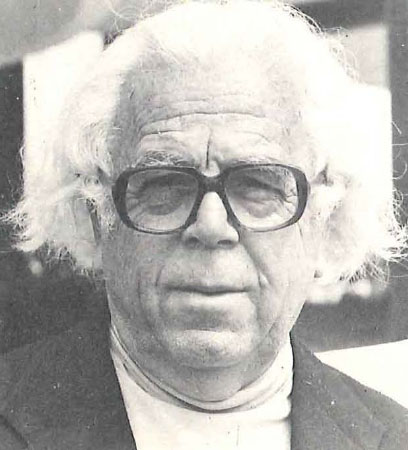
There are many things I do not know, but one thing has bothered me: I do not know how to paint. It has always been a little sorrow in my life that I couldn’t become a painter — since a painter one cannot become. Even though I tried, even though I chose Spyros Vassiliou as my teacher and was going to his house every Sunday with pencils and paper, I could not learn. Long after, Spyros told me that he had kept these smudged papers of mine. I don’t know if he’ll ever find them. From this early effort years later, some verses emerged:
On Sunday afternoons he was painting cages with open doors — always without birds — keys of houses big as crutches — on white paper with black pencil — never in colour — he who loved all colours — except black and white’. The truth is that my teacher was not giving me paints. But then, how are poems written…
With time I accepted the fact that I wasn’t going to be a painter, but my love for painting remained. Still I don’t know much about it, and writing of the painter Vassiliou, I cannot tell you to which School he belongs, I can’t recognise whom he is influenced by, I cannot say if he’s a great painter or a mediocre painter. The only thing I can say when I see a painting of his is that I’m moved, I’m pleased, I’m happy, depending on the subject.
A demolished house, an empty beach, an old mirror, a tin kafenion table, Hymettos full of light, sunlit Zappion. I could never end this if I mentioned all the titles of his paintings, which are never the same, not only in subject matter but in style, colour, and mood. Each painting is different and yet they all carry his seal. The colour of the sea is only his, the colour of the mountain is only his, even the red flowers in a basket have his own red.
But since I know nothing about painting, why do I write all of this? I’d better write of the person. It’s a subject I know better. After all, if I love the painter Vassiliou, that is a personal matter…. I’ve lived near him for many years. I was near him when he was painting a small chapel in Poros, when he was decorating the cathedral in Xylokastro. Up on the scaffolding while he was painting God Pantocrator or the Virgin, you’d think he was praying. I spent many summers in Aegina beside him while he was painting the caiques and the coffee shops, sitting on a stone and you’d think he was singing. But isn’t every painting of his a prayer or a song?
This Greek from Galaxidi has learned the secret: to work and pray, to paint and to sing softly, simply, humanly and always with dedication, with good humour, with ease and confidence, yet anyone who knows him well may guess that under the ease and the confidence there lies the agony of the artist and the toil of man.
The skies and the seas, the mountains and the sand, the streets and the beaches are himself and it may be for this reason that he often draws his own figure into a corner of his pictures like the Old Masters. But even without his figure, each painting is made in his own likeness.
‘Through the eyes of Vassiliou,’ Marinos Kalligas once wrote, ‘the trivial becomes precious, the forgotten acquires glory’. Who has even paid any attention to a half-finished house, to a staircase, to a sewing machine, to a cheap straw chair? But when we see these things painted by Vassiliou, we discover how much magic and poetry the most common and everyday things have in our lives. Tell me, is not the conversation of the four chairs on an empty beach one of the most beautiful Greek poems? For thirty years now — as long as I have known him and cherished him — I have lived in a circle of writers, poets, actors, painters, journalists and politicians. It is a beautiful world inhabited by superior people who are very special, but capricious, often difficult, spurred by passions and even hatreds which very easily break bones. I can lay my hand upon fire and swear, I have never heard anyone say one evil word about Vassiliou. His kindness, his open-heartedness, his innocence, have made him a most lovable person. The warmth, the freshness, the sensitivity and lyricism, the clearness: these elements that characterize his paintings cannot be detached from his being. In the times we live, it is not enough to be a great artist, it’s necessary to be a good man, as well.
I don’t think it’s a sacrilege that I, the ignorant one, should speak of the painter Vassiliou. To all that has been written about him and said of him, I have added this personal testament, which is nothing more, nor less, than what is true.
I would like to end this, with verses from Kalvos, Solomos, Sikelianos, or to read pages from the Gospels and Makriyannis, as I believe they are worthy of you, Spyro. But I will do something much simpler which I think befits you more. This moment I put my hand on my heart and greet you.







